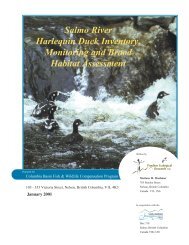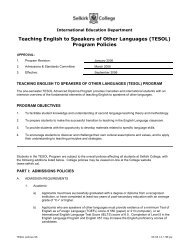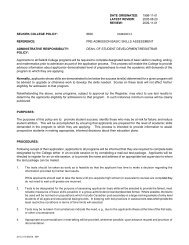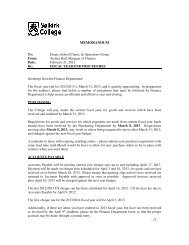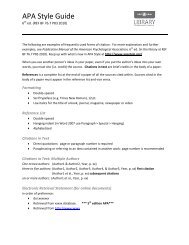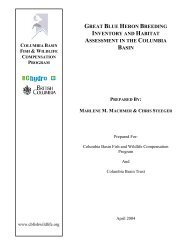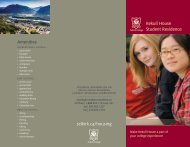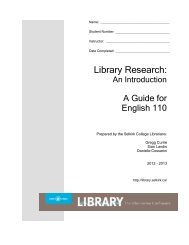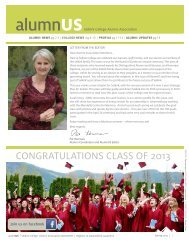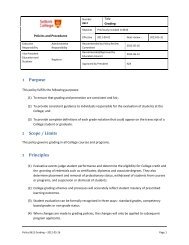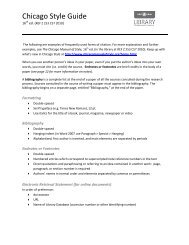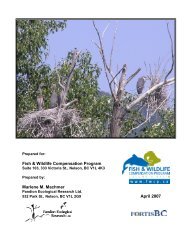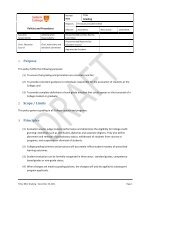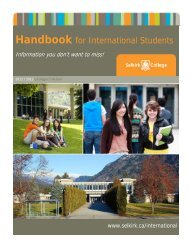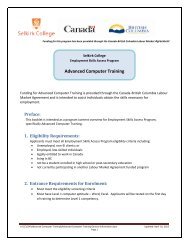selk irk.ca - Selkirk College
selk irk.ca - Selkirk College
selk irk.ca - Selkirk College
You also want an ePaper? Increase the reach of your titles
YUMPU automatically turns print PDFs into web optimized ePapers that Google loves.
Recreation, Fish and Wildlife<br />
Common Core<br />
The first year of Forest Technology, Recreation,<br />
Fish & Wildlife Technology and Integrated<br />
Environmental Planning Technology programs<br />
consist of a core of common courses emphasizing<br />
resource skills, knowledge and professionalism in:<br />
inventory, measurement, mapping, communi<strong>ca</strong>tions,<br />
math, and interpretation.<br />
The second year of each program synthesizes the<br />
skills, knowledge, and professionalism of first<br />
year with applied management, planning, and<br />
advanced techniques and principles. Integration of<br />
learning in each program is required.<br />
Students interested in dual diplomas <strong>ca</strong>n now<br />
complete any second or third diploma with one<br />
additional year of study.<br />
Curriculum Advisory<br />
The curriculum for this program is developed in<br />
consultation with the Program Advisory Committee<br />
(PAC). The PAC membership includes people<br />
who hire our students and many are past graduates.<br />
Organizations currently having representatives<br />
on the committee include: British Columbia<br />
conservation service, private consultants, and<br />
government agencies. The PAC meets regularly,<br />
and their feed back may result in changes to the<br />
program.<br />
Admission Requirements<br />
Program staff are committed to help students<br />
preparing for admission into the program.<br />
In addition to meeting the general entrance<br />
requirements for admission to Selk<strong>irk</strong> <strong>College</strong>,<br />
an appli<strong>ca</strong>nt must meet the following School of<br />
Renewable Resources program requirements:<br />
Please note in the chart below, the new math<br />
requirements for students entering Grade 10 in<br />
the 2010/11 school year.<br />
Career Potential<br />
Graduates are immediately employable and<br />
have developed <strong>ca</strong>reers such as: national park<br />
wardens, provincial park rangers, parks planning<br />
technicians, environmental interpreters,<br />
outdoor recreation technicians, fish and wildlife<br />
technicians, recreation resource officers, fisheries<br />
officers, and resource management technicians<br />
with private sector firms. Many graduates find<br />
work with consulting firms who serve the diverse<br />
resource management field. Employment rates<br />
over the past few years have over 75% of graduates<br />
working in the field of Recreation, Fish and<br />
Wildlife within two months of graduation.<br />
Degree and Diploma<br />
Options<br />
The Recreation Fish and Wildife Program now<br />
ladders into the Selk<strong>irk</strong> <strong>College</strong> Bachelor In<br />
Geographic Information Systems and counts as<br />
the first two years of this program.<br />
There is a long standing tradition of our<br />
graduates transferring and successfully completing<br />
university degrees. Selk<strong>irk</strong>’s Recreation Fish &<br />
Wildlife graduates have successfully transferred<br />
credit towards degrees in Universities throughout<br />
Canada and the United States. Selk<strong>irk</strong> <strong>College</strong><br />
also has formal transfer arrangements with the<br />
following institutions: University of Northern BC,<br />
University of British Columbia, Thompson Rivers<br />
University, University of Alberta. Additionally,<br />
students wishing to pursue Conservation Officer<br />
Training have successfully transferred credit to<br />
both Lethbridge <strong>College</strong> and Malaspina college.<br />
SECONDARY SCHOOL MATH<br />
ENTRANCE REQUIREMENTS<br />
Selk<strong>irk</strong> <strong>College</strong> Minimum Requirements<br />
Principles of Math 11 with a grade of “C+” or<br />
better, or Appli<strong>ca</strong>tions of Math 11 with a grade of<br />
“B” or better.<br />
Selk<strong>irk</strong> <strong>College</strong><br />
Recommended Requirements<br />
Principles of Math 11 with a grade of “C+” or<br />
better.<br />
Selk<strong>irk</strong> <strong>College</strong> Math Requirement (as of<br />
September 2013)<br />
Foundations 11 with a grade of “C+” or better.<br />
Highschool Graduates<br />
• Completion of senior secondary school<br />
graduation (or equivalent) with the following<br />
courses or their equivalents.<br />
• Biology 11 C+<br />
• Principles of Math 11 C+<br />
• English 12 C+<br />
Mature Students<br />
• Mature student entry is possible without<br />
secondary school completion but mature<br />
appli<strong>ca</strong>nts must have BIOL 11 or 12 and<br />
ENGL 12, or equivalent courses with a “C+”,<br />
and Principles of MATH 11 with a “C+”.<br />
• Appli<strong>ca</strong>nts may be required to complete<br />
preparatory modules in mathematics, writing<br />
and computers, where identified by the<br />
school.<br />
In individual <strong>ca</strong>ses, related work experience <strong>ca</strong>n be<br />
considered in the appli<strong>ca</strong>tion process at discretion<br />
of the School Chair.<br />
All appli<strong>ca</strong>nts must be in good health and reasonably<br />
good physi<strong>ca</strong>l condition. A demonstrated<br />
interest in, and aptitude for, outdoor work is<br />
essential as much of the work is done in the field,<br />
often under adverse and arduous weather and<br />
topographic conditions.<br />
For any questions related to prerequisites and<br />
support, please contact the School Chair.<br />
Computer Competency<br />
Computer competency is an important element of<br />
success in the program. It is strongly recommended<br />
that students have entry level experience<br />
with MS Word / MS Excel / and the internet<br />
prior to starting the program.<br />
Program Courses<br />
ENVR 150 Hydrology I<br />
This course is an introductory study of water in<br />
our environment including its properties, the<br />
natural processes which affect it, climate and<br />
weather, and practi<strong>ca</strong>l experience in the collection<br />
and analyses of field and laboratory data using<br />
standard techniques and equipment.<br />
ENVR 160 Surveying and<br />
Field Measurements<br />
This course covers the practi<strong>ca</strong>l use of common<br />
survey instruments and techniques used by<br />
environmental technicians. As well, the course<br />
will introduce the student to various sampling<br />
methods used to collect, assess, classify, and evaluate<br />
field data. Emphasis is placed on the proper<br />
<strong>ca</strong>re and use of basic surveying and measurement<br />
tools and the skills involved in collecting and<br />
interpreting precise and accurate field data.<br />
ENVR 162 Applied Botany and<br />
Ecosystem Classifi<strong>ca</strong>tion<br />
This course is an introduction to the basics of<br />
Botany and Ecosystem Classifi<strong>ca</strong>tion. Botany<br />
lectures will focus on plant classifi<strong>ca</strong>tion, botani<strong>ca</strong>l<br />
terms, plant morphology, and plant physiology.<br />
Topics include: plant cells, tissues, and organ<br />
structure and function, photosynthesis and<br />
respiration transpiration and translo<strong>ca</strong>tion.<br />
During botany labs, students will learn to identify<br />
about 100 native plants commonly found in the<br />
West Kootenay Region of BC.<br />
Ecology lectures will focus on ecosystem<br />
classifi<strong>ca</strong>tion using the Biogeoclimatic Ecosystem<br />
Classifi<strong>ca</strong>tion System (BEC) of BC. Other key<br />
topics include the study of climatic factors and<br />
climate change, disturbance and succession, and<br />
lands<strong>ca</strong>pe and stand structure. Ecology labs focus<br />
on classifying ecosystems (including soils, site<br />
and vegetation) to site series using BEC. Labs are<br />
mainly field based.<br />
School of Environment and Geomatics<br />
Selk<strong>irk</strong> <strong>College</strong> 12/13<br />
191



